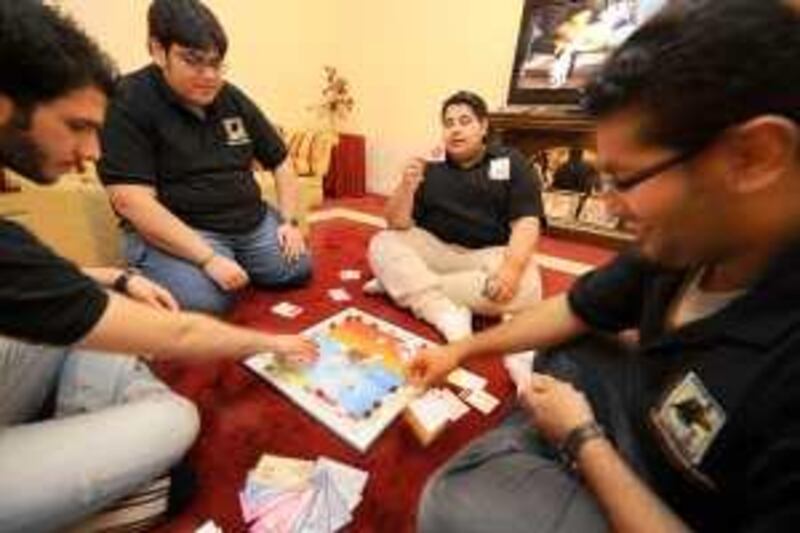KUWAIT CITY // An innovative group of Kuwaiti teenagers recently won first prize in a competition for young entrepreneurs by producing a Monopoly-style board game where the squares are not named after the city's streets but sold to local companies as advertising space. To avoid copyright infringements, the makers said their board game, al Dallal, which is Arabic for "the broker", has swapped the well-known features of the American version for local alternatives. For example, in Monopoly, when players land on the "go to jail" square, they miss three turns unless they want to buy their way out; in the Kuwaiti version of the game they are sent on a flight with the local carrier Wataniya Airways for three turns unless they want to pay to come back early.
They also replaced the original game's character, the top hat-wearing icon known as Mr Monopoly, with a traditionally dressed local called Bu Bender. The young entrepreneurs said they consulted a lawyer before making their version. Mubarak al Ghurba, the group's 17-year-old vice-marketing manager, said: "If you change the design and the colours, it's yours, but with al Dallal we have changed the whole concept of the game.
"With al Dallal, win or lose, you're going to learn about Kuwaiti culture and companies," Mubarak said. "If you're hungry, you're going to call Mini Delights, if you're sick, you're going to go to Maidan Clinic," which are both properties on the board. Monopoly's owner, Hasbro, declined to comment on what can legally be copied from the game. The idea came about in March when 20 teenagers from Abdullah al Rujaib High School took part in a competition to promote business awareness run by a non-governmental organisation called Injaz. Calling themselves Made 'n Q8, the group beat competition from 30 other schools at a final in June and won the right to compete against winners from other Arab countries next year.
The competition's rules said the groups could not be sponsored and that their initial capital must be no more than 75 Kuwaiti dinars (Dh964). So to raise the 9,000 dinars needed to make 3,000 games, the group pitched the idea of selling the properties as advertisements to around 70 local companies, 35 of whom eventually accepted. For each square on the outside of the board, known on the original game as streets, advertisers had to pay 250 dinars each, the corner spaces were 500 dinars and the squares on which players take a "chance" or "community chest" card were priced at 1,000 dinars. The game is in Arabic.
With some companies, they struck alternative deals. A marketing and communications company called Artistic View designed the game in return for a place on the board while an online shopping service called ta9seel.com provides free delivery to customers for another space. For three "chance" squares, Kuwaiteshop.com made the games at a reduced price. The companies are grouped into different sectors that players have to complete before buying property: one group is for media companies, another is for car dealers and another for internet cafes. The traditional railways have been replaced by Kuwait's islands and instead of free parking there is a free zone.
Burgan Bank, which bought the squares that tax players in Monopoly, did not want to be seen to be taking the players' money, so instead, they receive money. Mubarak said this makes sense "because there are no taxes in Kuwait". The board sells for 6.5 dinars, and the group has sold half of the 3,000 it initially made, raising around 9,000 dinars. Some members of the group have gone on to college and there have been some who were ejected for not pulling their weight, but the 14 who remain plan to reinvest the money into new English and Arabic versions of the game. Until now, they have hired stalls in shopping centres and sold it themselves but they plan to sell the next batch to toy shops.
The group plans to release a Gulf version of Monopoly and develop a local adaptation of Guess Who?, the game where players have to identify which face card their opponent is holding by asking questions about the gender and size and shape of its features. The Kuwaiti version will use the faces of local personalities. The use of local culture in a western game has caught the country's imagination and the group's members have conducted dozens of interviews for the media. "Even people in high places are talking about it," Mubarak said. "Yesterday, I met the son of the emir and he told me he has five of the sets in his house and plays them with his kids. I was totally shocked."
But they still believe there is room for improvement. Abdullah Hassan, 17, the group's vice-manager of finance, said: "Our biggest mistake was making the houses and hotels with wood because they're not always a perfect colour, they have some sharp edges and some are not the right size." He said next time they will make them from plastic. Made 'n Q8 hopes to establish a real company soon and its members have been in discussions with the Public Authority for Youth and Sport. Abdullah said the authority will provide some initial funding and help them with Kuwait's business start-up procedures. He said many of the country's major companies now want to be involved, and next time, they will have to pay a lot more for a property.
Monopoly's website says it is the best-selling board game in the world, with more than 200 million copies sold in total. jcalderwood@thenational.ae





